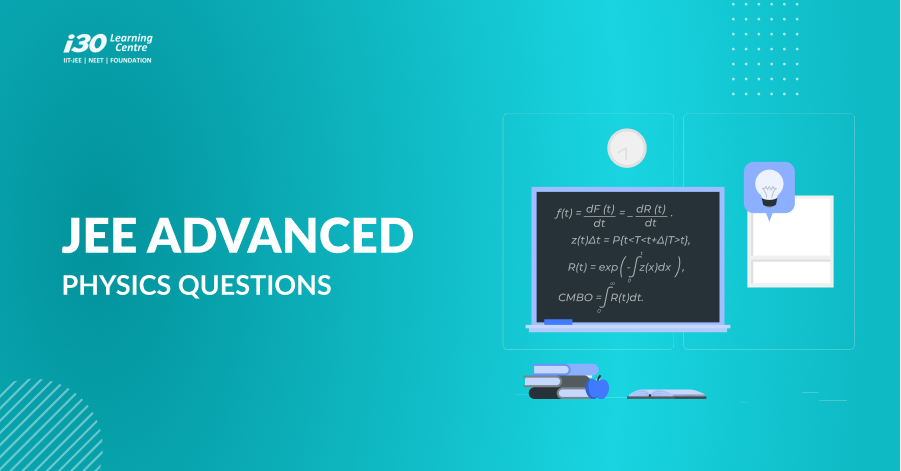The JEE Advanced is one of the most complex entrance examinations in India. Every year, lakhs of students aspire to crack this exam. However, only the top 2,50,000 students in the JEE Main can take the examination.
The difficulty level of JEE Advanced is way more compared to the JEE Main. Hence, preparation for JEE Advanced requires enormous practice and hard work.
This article is a comprehensive guide to the JEE Advanced physics questions, syllabus, and tips and tricks to score well in physics.
To score well in physics, you need to have a methodological approach. Aspirants should solve a lot of previous years’ questions, take mock tests, and focus on time management to compete among the best minds to score well in the JEE Advanced exam.
Is JEE Advanced Physics Hard?
Many students believe that the JEE Advanced physics part is very challenging. Aspirants must therefore work harder and make extra efforts to succeed in this section. The physics section consists of complex derivations and concepts.
To score well in physics, students must have strong conceptual knowledge and comprehend the application of the concepts. With thorough practice, speed, accuracy, and good time management skills, you can aim for a decent physics score in the upcoming JEE Advanced examination.
How to Score Well in JEE Advanced Physics
Some tips regarding how to score well in JEE Advanced Physics are listed below:
- First, understand the syllabus and weightage of the physics topics. It will help you spend time judiciously on various chapters.
- Spend at least two to three hours on physics alone, apart from your regular classes and coaching.
- Extend your practice time after completion of board exams.
- Pay attention to your classes at school and at the coaching centers.
- Refer to the study materials and make the best use of them.
- Discuss your doubts with teachers and mentors immediately.
- Make use of online resources and listen to good YouTube lecturers.
- Refer to the NCERT textbook initially. The NCERT textbook shapes your foundation.
- Refer to a book for conceptual understanding.
JEE Advanced Physics Syllabus
The organizing body has designed the JEE Advanced Physics syllabus to provide effective and application-based learning. Unlike maths and chemistry, the syllabus for JEE Advanced physics assesses the students’ conceptual comprehension and application.
Students often consider the JEE Advanced physics course to be complicated and extensive. As a result, it is vital to start your preparation with a thorough understanding of the concepts. Get your basics right, and then gradually proceed to more complex theories and concepts.
The JEE Advanced physics syllabus comprises several topics. We have listed the detailed JEE Advanced physics syllabus here.
- General Physics
- General Units and dimensions.
- Methods of measurement and error analysis.
- Experiments based on using Vernier calipers and screw gauge
Young’s modulus. - The focal length of a concave mirror and a convex lens using the u-v method,
- Speed of sound.
- Verification of Ohm’s law.
- Mechanics
- Kinematics in one and two dimensions.
- Projectiles.
- Uniform circular motion.
- Relative velocity.
- Newton’s laws of motion.
- Kinetic and potential energy.
- Conservation of linear momentum and mechanical energy.
- Systems of particles.
- Centre of mass.
- Impulse.
- Elastic and inelastic collisions.
- Moment of inertia.
- Parallel and perpendicular axes theorems.
- Moment of inertia.
- Angular momentum.
- Torque.
- Conservation of angular momentum.
- Cylinders and spheres.
- Equilibrium of rigid bodies.
- Resonance.
- Linear and angular simple harmonic motions.
- Hooke’s law.
- Young’s modulus.
- Law of gravitation.
- Kepler’s law.
- Motion of planets.
- Pascal’s law & Buoyancy.
- Bernoulli’s theorem.
- Wave motion.
- Doppler effect.
- Thermal Physics
- Calorimetry.
- Elementary concepts of convection and radiation.
- Newton’s law of cooling.
- Laws of thermodynamics.
- Kirchhoff’s law.
- Wien’s displacement law.
- Stefan’s law.
- Electricity and Magnetism
- Coulomb’s law.
- Electric field and potential.
- Electric field lines.
- Flux.
- Gauss’s law.
- Capacitors.
- Electric current.
- Ohm’s law.
- Biot–Savart’s law and Ampere’s law.
- Electromagnetic induction.
- Faraday’s law.
- Lenz’s law.
- Electromagnetic Waves
- Electromagnetic waves and their characteristics.
- Electromagnetic spectrum.
- Optics
- Reflection and refraction.
- Total internal reflection.
- Deviation and dispersion of light by a prism.
- Huygens principle.
- Young’s double slit experiment.
- Polarization of light.
- Modern Physics
- α, β and γ radiations.
- Law of radioactive decay.
- Binding energy.
- Fission and fusion.
- Photoelectric effect.
- Bohr’s theory.
- Moseley’s law.
- de Broglie wavelength.
JEE Advanced Physics Questions Book
Physics is a subject that requires a thorough understanding of the concepts and good problem-solving capabilities. To ace the physics section in the upcoming JEE Advanced examinations, you must have a proper strategy.
The foremost step is to understand the concepts. We suggest NCERT textbooks and the concepts of physics for this purpose. Before jumping to the numerical, take your time and go deeper into every topic. The numerical examples in the physics section is more or less an application of the concepts.
Once you are confident with the concepts, the next step is to practice numerical questions. We recommend the following books for your practice:
- Problems in General Physics by I.E. Irodov.
- Fundamentals of Physics by Halliday, Resnick & Walker.
- Problems in Physics by S.S. Krotov.
- Problem Book in Physics for IIT JEE by DC Pandey.
- Physics Galaxy 2023: JEE Advanced – Physics by Ashish Arora.
- Practice Book Physics for JEE Main and Advanced by Arihant Publications.
FAQ: JEE Advanced Physics Questions
Which is the hardest paper of JEE Advanced?
Most of the aspirants consider mathematics as the hardest among the three subjects in the JEE Advanced examination.
Modern physics JEE Advanced questions
Modern physics comprises topics like the laws of radioactivity, the dual nature of radiation, fission, and fusion, Bohr’s theory, Moseley’s law, and de Broglie wavelength.
Wrapping Up
For a competitive exam like JEE Advanced, the difficulty level may vary every year. Therefore, an aspirant must prepare from day one to face the utmost challenges of this exam.
The physics section requires very good conceptual knowledge and practice of numerical. Hence, to do well in the JEE physics paper, one needs a strong sense of self-assurance, conceptual precision, accuracy, and time management abilities.
Get your basics right, work towards a solid conceptual understanding, and practice a lot of mock tests and previous JEE Advanced physics questions. Write to us about your thoughts on the physics paper, and your approach to preparation.



